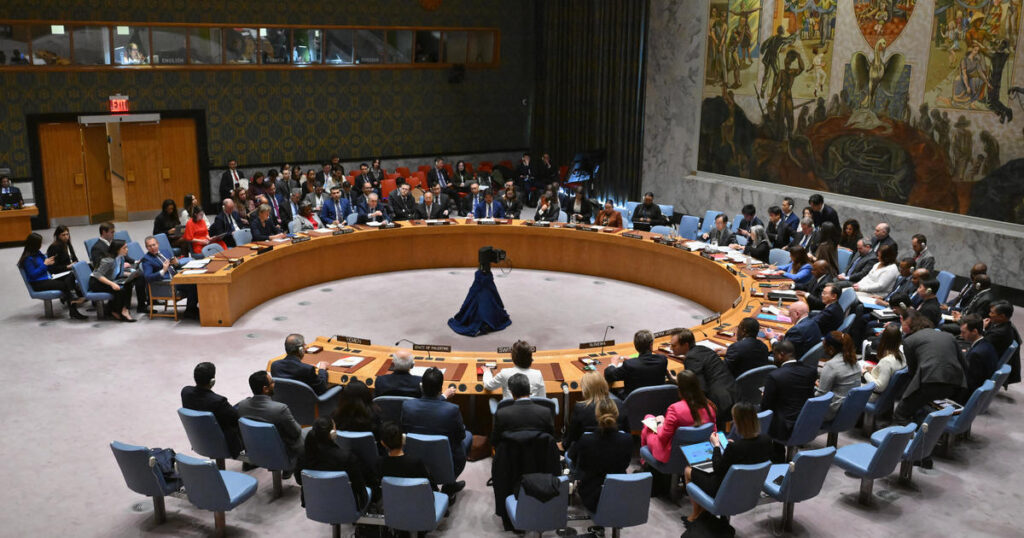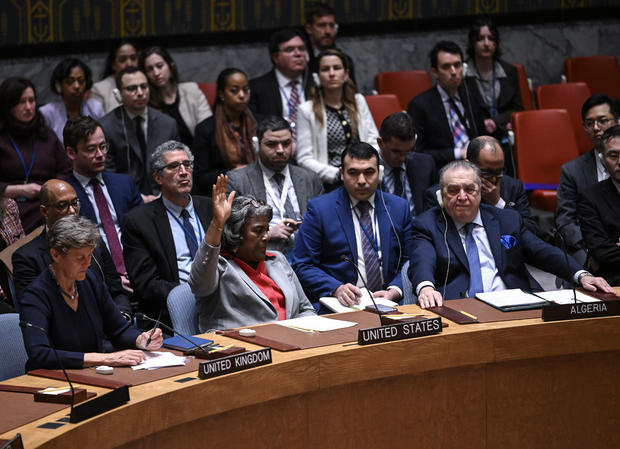The United Nations Security Council on Monday called for a ceasefire in the Gaza Strip during the Islamic holy month of Ramadan, its first call for a cessation of fighting. The United States abstained from the resolution and also called for the release of all hostages taken in the October 7 Hamas attack in southern Israel that sparked the war. The measure does not link demands for the release of the hostages to calls for a ceasefire during Ramadan, which ends on April 9.
Immediately after the vote, UN Secretary-General Antonio Guterres said: said on social media “Resolutions must be implemented. Failure is not an option.”
Given the Ramadan calendar, the resolution calls for a ceasefire of just two weeks, but the draft law says a cessation of fighting should lead to a “durable and sustainable ceasefire.”
Since the start of the war, the Security Council has adopted two resolutions regarding the deteriorating humanitarian situation in Gaza, but neither called for a ceasefire.
UN calls for cessation of fighting for the first time
The vote came after Russia and China vetoed another resolution proposed by the United States on Friday. The resolution supported an “immediate and lasting ceasefire” in the civil war. conflict between israel and hamas.
The United States warned that the resolution approved on Monday could hamper negotiations between the United States, Egypt and Qatar toward a more permanent solution to their ongoing hostilities.
The resolution was proposed by 10 elected members and supported by Russia, China, and the United Nations Arab Group of 22 countries. The United States, like China and Russia, is a permanent member of the Council and can therefore override any resolution with a single veto vote.
In a statement released Friday night, the Arab group urged all 15 board members to “act with unity and urgency” to “stop bloodshed, protect lives and avoid further human suffering and destruction.” and urged them to vote on the resolution.
“The time for a ceasefire is long past,” the Arab group said.
More than 32,000 Palestinians have been killed in Gaza since the start of the conflict, according to the Hamas-run Gaza Health Ministry. The agency does not count civilians and combatants separately, but says two-thirds of the dead were women and children.
Gaza is also facing a dire humanitarian emergency following a March 18 report from international authorities on famine warnings. 'Famine is imminent' in northern Gaza And the escalation of the war could push half of the territory's 2.3 million people to the brink of starvation.
Israel says US 'withdrawal' at UN 'gives hope to Hamas'
The vote marks a new showdown involving world powers embroiled in tense conflicts elsewhere, with the United States facing criticism for not showing enough strength against its ally Israel. Tensions between the two countries increase.
Tensions rose again after the US abstained, allowing the resolution to be passed on Monday.Israeli Prime Minister Benjamin Netanyahu's office condemned the move in a social media post This referred to the United States' veto of previous resolutions that, like the one approved this time, did not directly link a ceasefire to war, and stated that “the United States' consistent position in the Security Council since the beginning of the war… “This is a clear setback for the Release of remaining Israeli hostages.
“This withdrawal has a negative impact on both the war effort and hostage release efforts, as it gives Hamas hope that international pressure will lead to a ceasefire being accepted without the release of the hostages,” Netanyahu's office said in a statement. .
Additionally, Prime Minister Netanyahu warned the Biden administration that if the US refused to block the new resolution, he would cancel a military delegation's visit to Washington to discuss plans for a ground attack on the crowded southern city of Rafah in Gaza. he added.
Fatih Aktas/Anadolu/Getty
“In view of the change in the US position, Prime Minister Netanyahu has decided that the delegation will not go,” Netanyahu's office said in a social media thread on Monday.
National Security Council spokesman John Kirby told reporters: “They are not coming to Washington, D.C., to have a meaningful conversation with them about viable alternatives to being on the ground at Rafah.'' It's very unfortunate,” he told reporters. Monday.
The United States has vetoed three previous resolutions calling for a ceasefire in the Gaza Strip, most recently on February 20 in favor of Arabs. The resolution was supported by 13 members, with one abstention, reflecting overwhelming support for the ceasefire.
Russia, China slam early US draft as 'rhetorical exercise'
In late October, Russia and China vetoed a U.S.-sponsored resolution calling for a moratorium on fighting to deliver aid, the protection of civilians and the disarmament of Hamas. They said this did not reflect global calls for a ceasefire.
They again vetoed the U.S. resolution on Friday, calling it ambiguous and not a direct call for an end to the fighting that much of the world is calling for.
A key issue was the unusual language in the US draft. The Security Council also “determines that an immediate and lasting ceasefire is essential.” This expression was not a simple “request'' or “call'' to cease hostilities.
Before Friday's vote, Russia's Ambassador to the United Nations Vasily Nebenzia said Moscow supported an immediate ceasefire, but criticized the weak wording, calling it philosophical language out of step with U.N. resolutions.
He accused U.S. Secretary of State Antony Blinken and U.S. Ambassador Linda Thomas-Greenfield of “deliberately misleading the international community” about their call for a ceasefire.
John Lamparski/Getty
“This was some kind of empty rhetorical exercise,” Nebenzia said. “American products are highly politicized and their only purpose is to toy with voters and throw them a bone in the form of any mention of a ceasefire in the Gaza Strip…and to promote voter impunity. “Israel does not even evaluate crimes committed during conscription.”
China's ambassador to the UN, Zhang Jun, said the US proposal sets preconditions and falls far short of the expectations of council members and the broader international community.
“If the United States was serious about a ceasefire, it would not have vetoed multiple council resolutions so many times,” he said.




